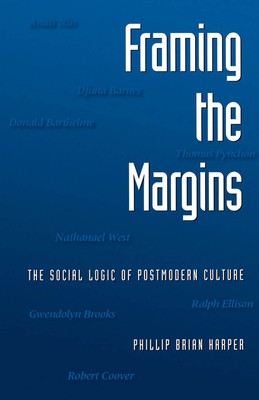
- We will send in 10–14 business days.
- Author: Phillip Brian Harper
- Publisher: Oxford University Press, USA
- ISBN-10: 0195082397
- ISBN-13: 9780195082395
- Format: 13.9 x 21 x 1.8 cm, softcover
- Language: English
- SAVE -10% with code: EXTRA
Reviews
Description
This dramatic rereading of postmodernism seeks to broaden current theoretical conceptions of the movement as both a social-philosophical condition and a literary and cultural phenomenon. Phil Harper contends that the fragmentation considered to be characteristic of the postmodern age can in fact be traced to the status of marginalized groups in the United States since long before the contemporary era. This status is reflected in the work of American writers from the thirties through the fifties whom Harper addresses in this study, including Nathanael West, Anaïs Nin, Djuna Barnes, Ralph Ellison, and Gwendolyn Brooks. Treating groups that are disadvantaged or disempowered whether by circumstance of gender, race, or sexual orientation, the writers profiled here occupy the cusp between the modern and the postmodern; between the recognizably modernist aesthetic of alienation and the fragmented, disordered sensibility of postmodernism. Proceeding through close readings of these
literary texts in relation to various mass-cultural productions, Harper examines the social placement of the texts in the scope of literary history while analyzing more minutely the interior effects of marginalization implied by the fictional characters enacting these narratives. In particular, he demonstrates how these works represent the experience of social marginality as highly fractured and fracturing, and indicates how such experience is implicated in the phenomenon of postmodernist fragmentation. Harper thus accomplishes the vital task of recentering cultural focus on issues and groups that are decentered by very definition, and thereby specifies the sociopolitical significance of postmodernism in a way that has not yet been done.
EXTRA 10 % discount with code: EXTRA
The promotion ends in 17d.07:59:03
The discount code is valid when purchasing from 10 €. Discounts do not stack.
- Author: Phillip Brian Harper
- Publisher: Oxford University Press, USA
- ISBN-10: 0195082397
- ISBN-13: 9780195082395
- Format: 13.9 x 21 x 1.8 cm, softcover
- Language: English English
This dramatic rereading of postmodernism seeks to broaden current theoretical conceptions of the movement as both a social-philosophical condition and a literary and cultural phenomenon. Phil Harper contends that the fragmentation considered to be characteristic of the postmodern age can in fact be traced to the status of marginalized groups in the United States since long before the contemporary era. This status is reflected in the work of American writers from the thirties through the fifties whom Harper addresses in this study, including Nathanael West, Anaïs Nin, Djuna Barnes, Ralph Ellison, and Gwendolyn Brooks. Treating groups that are disadvantaged or disempowered whether by circumstance of gender, race, or sexual orientation, the writers profiled here occupy the cusp between the modern and the postmodern; between the recognizably modernist aesthetic of alienation and the fragmented, disordered sensibility of postmodernism. Proceeding through close readings of these
literary texts in relation to various mass-cultural productions, Harper examines the social placement of the texts in the scope of literary history while analyzing more minutely the interior effects of marginalization implied by the fictional characters enacting these narratives. In particular, he demonstrates how these works represent the experience of social marginality as highly fractured and fracturing, and indicates how such experience is implicated in the phenomenon of postmodernist fragmentation. Harper thus accomplishes the vital task of recentering cultural focus on issues and groups that are decentered by very definition, and thereby specifies the sociopolitical significance of postmodernism in a way that has not yet been done.


Reviews